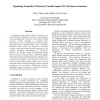Free Online Productivity Tools
i2Speak
i2Symbol
i2OCR
iTex2Img
iWeb2Print
iWeb2Shot
i2Type
iPdf2Split
iPdf2Merge
i2Bopomofo
i2Arabic
i2Style
i2Image
i2PDF
iLatex2Rtf
Sci2ools
IPPS
2007
IEEE
2007
IEEE
Pipelining Tradeoffs of Massively Parallel SuperCISC Hardware Functions
Parallel processing using multiple processors is a well-established technique to accelerate many different classes of applications. However, as the density of chips increases, another technique to accelerate these applications is the use of application specific hardware processing blocks in parallel within a chip. SuperCISC hardware blocks utilize this method to accelerate scientific, signal, and image processing applications. By applying pipelining methodologies to SuperCISC functions, the effective amount of parallelism already present can be further increased. Automated register placement within a combinational data flow graph (DFG) is governed by the desired maximum operating frequency provided as a parameter to the tool flow, as well as the results of static timing analysis of the circuit. Results presented include the design tradeoffs between increased performance, area, and energy. Additionally, benefits of pipelining compared to hardware replication as a means of achieving fur...
Distributed And Parallel Computing | Hardware Processing Blocks | Image Processing Applications | IPPS 2007 | SuperCISC Hardware Blocks |
Related Content
| Added | 03 Jun 2010 |
| Updated | 03 Jun 2010 |
| Type | Conference |
| Year | 2007 |
| Where | IPPS |
| Authors | Colin J. Ihrig, Justin Stander, Alex K. Jones |
Comments (0)

